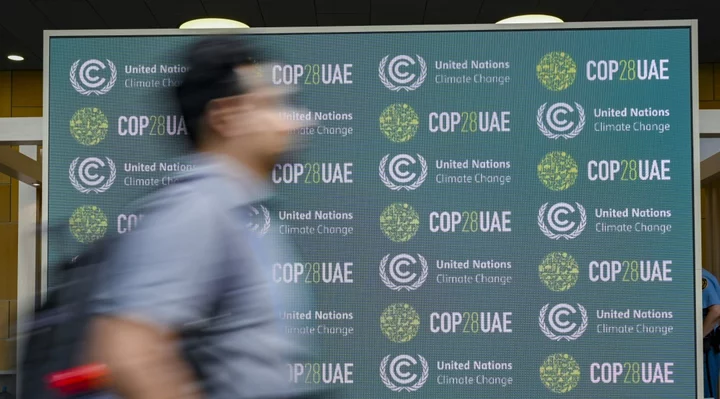Tucked into high-stakes debt ceiling negotiations is a critical energy provision that Democrats and Republicans in Washington both want -- at least in theory.
Energy permitting reform, which aims to cut down the time it takes for new projects to get approved, could be one of the few bipartisan measures to emerge from a debt limit deal. Or it could be left on the cutting room floor.
Here's what to know.
What is energy permitting?
Energy permitting may sound dry, but it's an important and necessary step for any plan that intends to bring new sources of energy to our homes and businesses. It's the shorthand term for all the environmental and technical approvals needed for a major energy project like a wind farm, massive solar array, electrical transmission line, or gas pipeline.
Essentially, it's the key hurdle to getting new energy projects built in the United States.
In the US, this process is particularly complex because there are multiple layers of government that project developers need to answer to: federal, state and local. For the federal government alone, there are multiple agencies that need to sign off on big energy projects -- creating multiple hurdles and dragging out the time before a project can be constructed.
Why is energy permitting reform needed?
Long wait times is the major problem permitting reform aims to solve. This isn't a new problem, but it's becoming more acute because of the major climate and energy law Congress passed last summer.
The Democrats' Inflation Reduction Act contained billions of dollars in tax credits designed to turbocharge energy -- especially clean energy -- in the US.
But while there's a ton of money for these projects, it still takes them a long time to get built.
"We've seen, over the last 10 to 20 years in this country, the regime that we used to permit projects has shifted to a point where it is simply unworkable to build infrastructure -- whether it be offshore wind, clean energy technologies or other infrastructure necessary just to make our economy work," RWE Renewables America executive Sam Eaton, who focuses on offshore wind, said at a recent industry conference.
Why is permitting reform part of the debt ceiling talks?
Permitting reform came up for a vote last year that failed in the Senate. Now, some lawmakers are hoping to stick it into must-pass legislation on raising the debt limit, since permitting is a complex and somewhat controversial issue.
Both parties agree that it takes far too long in the US to build new energy infrastructure, with a 5-year average wait time for projects to get all their necessary approvals and permits.
But where they disagree is what kind of projects need to be prioritized; Republicans want more gas pipelines and fossil fuel projects, while Democrats and the Biden administration are focused on clean energy and electrical transmission needed to spur the country's clean energy transition.
It's unclear whether this energy legislation will make it into a final debt-ceiling deal, and many hurdles remain. Some Democrats and environmental groups fear Republicans could leverage easier permitting to gut a bedrock environmental law. On the other hand, Senate Republicans could be hesitant to hand a big political win to West Virginia Democratic Sen. Joe Manchin -- a big permitting reform champion -- before he's up for reelection next year.
What's being proposed?
There are a lot of different energy permitting bills floating around Congress.
House Republicans recently passed a massive permitting package known as "HR1" -- not just the first House resolution of this session, but a signal that permitting reform is a top priority for the new GOP majority. That bill would significantly change the current federal environmental review process that major projects have to go through, increase federal oil and gas offshore leasing, and loosen mining laws for critical minerals.
"In order to address permitting reform, it needs to be for all energy, including pipelines and nuclear and hydropower," House Energy and Commerce Committee Chair Cathy McMorris Rodgers of Washington told CNN.
On the Senate side, Manchin has proposed a bill that would cap the amount of time the federal government can review and permit energy projects at two years. It would create one government body to review projects and set a statute of limitations in courts to cut down on wait times.
Manchin's most controversial item is green-lighting a natural gas pipeline in his home state of West Virginia. (Manchin proposed this framework in a bill last year that failed, albeit under different political circumstances.)
Another proposal from Senate Environment and Public Works Committee Chair Tom Carper of Delaware and Sen. Brian Schatz of Hawaii, both Democrats, would set two-year timelines for clean energy projects and prioritize the buildout of electricity transmission. Other Democratic lawmakers have put forth bills to reform centuries-old mining laws without gutting environmental review laws.
What are the environmental concerns?
Keeping the National Environmental Policy Act intact emerged as a top concern for many Democrats, who are afraid Republicans will seize permitting reform as an opportunity to gut the federal government's cornerstone environmental review process.
NEPA is a law that requires federal agencies to quantify the environmental impact of their actions and consider options that would be less damaging. It applies whenever a project crosses federal lands or could impact air or water quality regulated by the Clean Air Act.
Clawing it back could mean less oversight for projects that can pollute waterways or air -- whether they are related to fossil fuels or the byproducts of mining for critical minerals for electric vehicles.
"I'm concerned that we're going to give a bunch of big giveaways to the fossil fuel industry and take major bites out of bedrock environmental laws that will have long-term negative consequences," Rep. Jared Huffman of California, a Democrat, told CNN. "There's reason for grave concern if you care about climate and the environment."
What are the limits of permitting reform?
A federal permitting bill -- if it is passed -- won't touch state and local power to change or halt a project. And that could still stymie big energy buildout.
At a recent offshore wind conference, one executive said that state and local authorities can still present the biggest challenge to big renewable wind projects.
Clint Plummer, the CEO of New York-based offshore wind company Rise and Light Power, said most federal delays come from lack of staffing. But on the whole, federal agencies "tend to be very professional and very good at what they do."
"My experience has been the biggest challenges facing offshore wind are not the federal permitting challenges," Plummer said. "[They] tend to be the state and local approvals necessary for landing cables and connecting to the grid."
Plummer added most offshore wind projects have either faced significant delays or mounting costs to obtain these approvals for cable connections or transmission rights and said wind companies must work hard to be engaged in the local communities that have "a lot of power to delay, or in some cases, kills projects."









